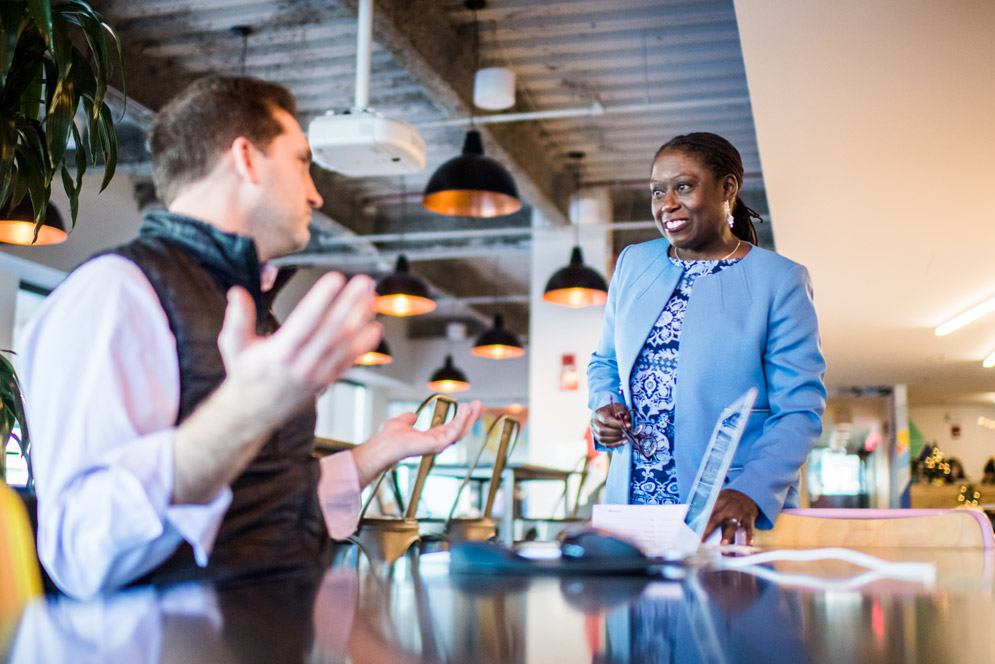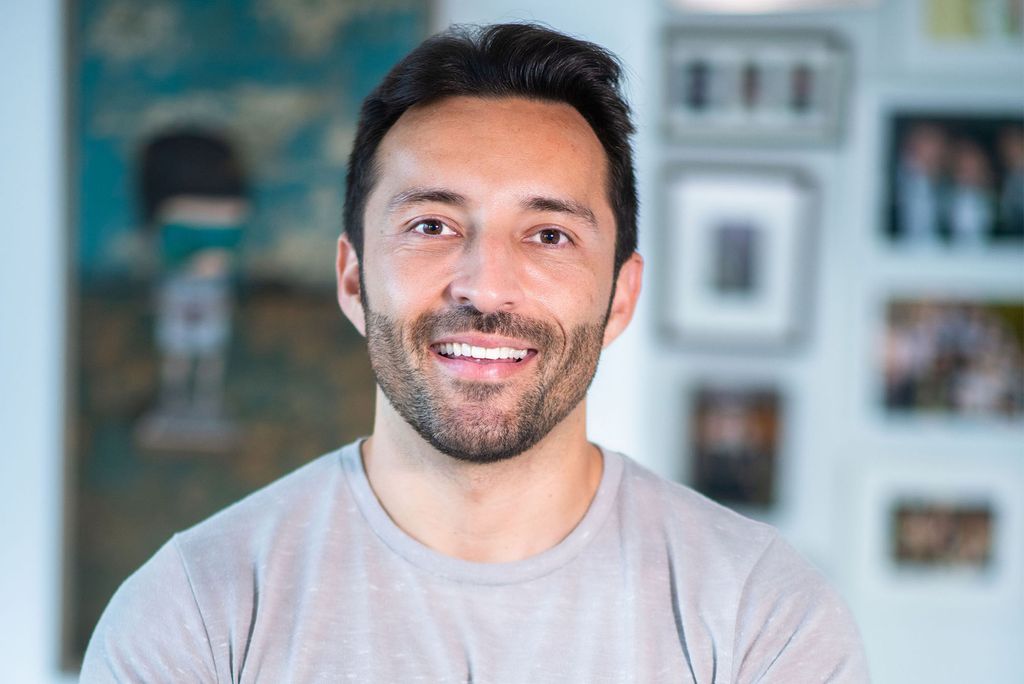Helping Students in Struggling High Schools Become Entrepreneurs
Ayele Shakur, CEO of nonprofit BUILD: “Our kids are amazing”
They are determined to use their experience, influence, and positions to help make their business, organization, and world a more inclusive place. They are breaking barriers—and then reaching back to help those behind them overcome the same hurdles. They are mentoring students or younger colleagues, hiring diverse candidates, offering opportunities, and ensuring that employees succeed and are promoted so that their workplace and their communities reflect the richness and talents of the country’s increasingly diverse population.
They are BU alumni, faculty, and staff—of every race, ethnicity, age, and gender—and they are “Opening Doors” for the next generation.
Ayele Shakur grew up in the largely low-income Roxbury section of Boston during a time of racial unrest and upheaval. The city was under a court order to desegregate its public schools and in 1974 began busing thousands of black students to schools outside their segregated neighborhoods.
Shakur (Questrom’87) didn’t merely witness the racially charged and sometimes violent protests—she lived them. Despite that, her family felt it was important to stay put. They believed that as a visible example of professional success, the best way for them to support Roxbury was by living there. Shakur’s father, Salim Shakur (LAW’63), was a criminal defense attorney at Roxbury Defenders and had been an assistant district attorney before going into private practice. Her mother, Carolyn Tutt Shakur (Sargent’60) was a physical therapist for the Visiting Nurse Association and later worked at a VA hospital in Brockton, Mass.
Shakur sees her work today as carrying forward the lessons her parents taught her about how a supportive community can create opportunity. She is the CEO of BUILD, a national program that helps students in struggling high schools become entrepreneurs. The students—98 percent of them African American or Latino—get a real-world hands-on education in finance, marketing, and other aspects of running a business.
They come up with ideas for a product or service, develop a business plan, and present it to an investor committee made up of volunteers from the local business community. Selected students receive $300 to $1,000 in seed money and get coaching from local businesspeople as they build their businesses.
“We’re working with high schools to develop a more racially diverse future workforce,” Shakur says. “But more than that, we are going to the kids who are often overlooked or discounted.”
BU Today spoke with Shakur about confronting racism, heading a nonprofit as a woman of color, and providing opportunities to students in struggling schools.
-
BU Today: What was your experience at BU like?
Shakur: I was part of a very small African American community of students. We were in a close-knit, vibrant community of color. Back in the ’80s, BU had a real commitment to diversity and actively recruited students of color. We were opening doors to students whose high schools may not have prepared them as much for college. There was a real push to give them a shot.
-
How are you opening doors for these students in struggling high schools?
BUILD specifically targets low-performing schools and those students who might not be that great in school. We find bright, capable kids who are not necessarily excited about school, because they haven’t found the right thing to inspire them. As they form businesses and take their products from concept to customer, what they are learning in school starts to come alive for them.
“One thing we hear with corporate partners is, ‘We value diversity.’ But then we don’t see it. Diversity takes work; it doesn’t happen by accident.”
-
Have you ever felt as though a door was not open to you because of your background?
I don’t think I’ve personally understood racism as a barrier. When I was growing up in Boston, in the 1970s, Boston was in the middle of the busing issue. I would see white people throwing rocks at buses and pulling their kids out of a school because black children were being bused in. And back then, we couldn’t go to certain parts of the city because you might not come back alive. But my father taught me to confront racism, and then to go around it to where I wanted to be and not let it stop me. So, there might have been times that I had been blocked, but I would pretty much just go around whatever the obstacle was.
-
What are the more subtle forms of intolerance or racism you’ve faced?
I am aware that very few nonprofit organizations are headed by women of color, although many of these organizations are attempting to work with low-income communities of color. But most of the stories I hear of people having to overcome racism have come from people in corporate America.
-
How has your understanding of racial disparities informed your work now?
We always hear about an achievement gap between students of color and other students. But I think it is more of an opportunity gap. The talent is there. We know it is. We’ve seen it. But students in struggling schools don’t have the same kind of access to opportunity. They don’t have the aunt or family friend who can help them get an internship or entry-level job at her company.
What we’re doing awakens people to inequities in schools and helps them to see things in a different light. Employers working with BUILD come into the schools as coaches or as judges for contests. Some of the businesspeople we partner with have never been in these schools before and have these preconceived notions of what they’ll find there. They are blown away by how talented our kids are. Very often it’s a white male saying [about a student], “I would hire that young man tomorrow.” And of course, we’re like, “Didn’t you know? Our kids are amazing.”

Shakur talks with colleague Ed Wilson at WeWork.
-
What can people do in their own workplaces to make them more inclusive, diverse, and welcoming?
One thing we hear with corporate partners is, “We value diversity.” But then we don’t see it. Diversity takes work; it doesn’t happen by accident.
They need to look for talent in more places and come into that community they bypass on the commuter rail.
[They also need] more targeted recruitment strategies aimed at finding diverse candidates. For instance, in Boston I always post job openings in the Bay State Banner, a community newspaper, or in the WORD, an online newsletter. Both mediums reach communities of color.
And does that entry-level position really require a four-year degree? I’ve learned that a lot of employers list a bachelor’s degree among their requirements, not because you need one to do that job, but as a vetting tool. Recently, BUILD got one of its employer partners to stop doing that. Of course, we want our kids to meet employers’ high standards, but a four-year degree isn’t the only way to do that.
-
Can you talk about the current political climate with respect to diversity and inclusion?
It’s an instructive time, because there are people who have been lulled to sleep, believing we don’t have any more work to do. There was so much talk during the Obama administration of a postracial society. I was wondering, where is that?
But in the age of Trump, you can’t be white in America and not see race as an issue. It’s like we’re back in 1970s Boston. Some good can come out of it, though, once we get past the hostility. The hopeful thing is that we have a generation of young people who are aware and vigilant in dismantling systems of oppression.
-
Why is doing diversity and inclusion work important to you?
My father was the beneficiary of diversity efforts. We called it Affirmative Action back then. He grew up in the Orchard Park Projects in Boston, but he was able to go to a private school—Boston College High School—on a scholarship. Then he attended BU School of Law at a time when it was actively working to bring in students from diverse backgrounds. It was the opening of doors in that era that created the black middle class—parents who could send their kids to college and expose them to broader opportunities.
Leah Samuel can be reached at leahsamuel@gmail.com.
Do you know BU alumni, faculty, and staff who are opening doors or breaking barriers themselves? Email Cindy Buccini at cbuccini@bu.edu and recommend them for our series “Opening Doors.”
This Series
Also in
Opening Doors
-
October 23, 2023
Opening Doors: Fundación ConEducación
-
July 31, 2023
Opening Doors: Arianne Kidder and Jason Robart
-
April 21, 2023
Opening Doors: Esther Kisaghu (SPH’06)




Comments & Discussion
Boston University moderates comments to facilitate an informed, substantive, civil conversation. Abusive, profane, self-promotional, misleading, incoherent or off-topic comments will be rejected. Moderators are staffed during regular business hours (EST) and can only accept comments written in English. Statistics or facts must include a citation or a link to the citation.